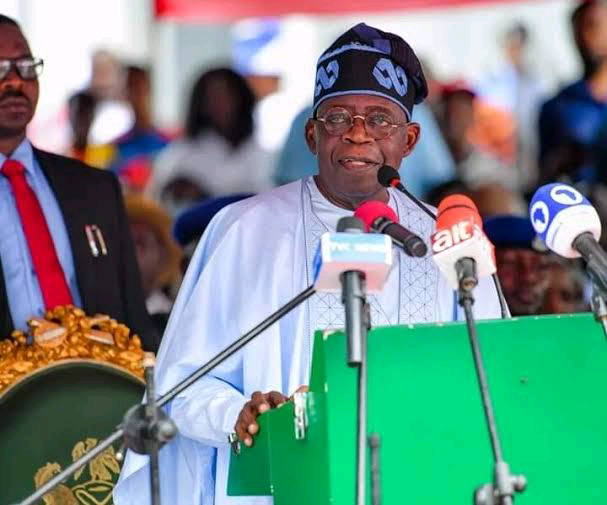2025: Even as Tinubu’s reforms press on
For most Nigerians who crossed over into the new year, 2025, it must be with mixed feelings. In one vein, they are celebrating the sheer good fortune of seeing a new year in spite of the harrowing times and circumstances of the previous year, 2024, during which the fallouts from the economic restructuring ventures of […]

tinubu 4
For most Nigerians who crossed over into the new year, 2025, it must be with mixed feelings. In one vein, they are celebrating the sheer good fortune of seeing a new year in spite of the harrowing times and circumstances of the previous year, 2024, during which the fallouts from the economic restructuring ventures of the Bola Tinubu administration wreaked havoc on a wide cross section of the citizenry.
So hard put were most Nigerians by the scourge from the impact of such measures, which included unprecedented escalation of prices of food stuff and most basic items, that their resilience was stretched to the limit.
To accentuate the intensity of the deleterious impact of the measures was the incident of nationwide protests in August last year. The protests, which were eventually crushed with an iron fist by the administration, did not help the image of the president, even as he promised to dialogue with the restive youth of the country to avert future occurrences.
In another vein is the fear that the heat from the reforms of the previous year may not have abated enough to guarantee less economic privations in the new year, being the second one in which the Nigerian economy has been reeling from a shock therapy – courtesy of tinkering by President Bola Tinubu, with some tinge of detachment from the pains of the afflicted Nigerians. Hence even as his reforms may be intended for the good of the country, the public misgivings over them in 2025 is captured in the lesson of the African proverb, which says that a man bitten by a snake would normally be scared by the sight of a rope.
- I’m dedicated to creating opportunities for emerging filmmakers — Abdulkareem Mohammed
- EFCC’s aggressive tactics leave trails of human right abuses
Meanwhile, the president has spared no effort in celebrating some of the incipient gains from the various reform measures, which could be admitted as constituting a silver lining on the horizon.
Against the backdrop of the ferocity with which the pains of the reforms hit the country, the incipience of positive dividends from same at this time cannot be seen as too early.
Among the early positives from the reforms is the flickering recovery of the naira from its hitherto unprecedented drop in exchange value, vis-a-vis the dollar and other leading currencies of the world following its launch into free float by the administration’s reform policies. Another is the progressive drop in the price of petrol due to increase in local refining capacity and attendant competition in the market, with the coming on stream of several refineries, including the Dangote Refineries Limited, Port Harcourt Refining Company Limited (PHRC), and just recently, the Warri Refinery and Petrochemical Company (WRPC). There are other positives as well, their slow pace of incipience notwithstanding.
However, the pains had etched so deeply in the minds of a wide cross-section of the citizenry that even with the president’s claims and assurances, not a few Nigerians still regard with a pinch of salt, such assurances, given their experiences of his near draconian disposition in the past 18 months the administration has been in office.
With 2025 now here, the question is whether Nigerians would see a continuation of the old Bola Tinubu or a more pliable and consultative president, who, during his 2023 presidential campaign tour in Port Harcourt, described himself as a leopard to Nyesom Wike, the then governor of Rivers State. Put succinctly, will he drive the reforms in 2025 in a new style, even as the real life leopard has not bleached its spots.
The concern over the president’s disposition for 2025 is accentuated by the issues that will dominate the polity in the course of the new year, and whose success will depend solely on the president adopting a posture of constructive engagement with sundry stakeholders. In that context, an insight into the issues that will trend in the polity can be gleaned from at least three recent outings by the president. These comprise the presentation of the 2025 budget to the National Assembly, the December 2024 media chat he had with a team of journalists, and his new year nationwide broadcast.
From these outings, the following issues, which appear in no particular order and may lead the national discourse in the new year, include the 2025 federal government budget now before the National Assembly, the trending tax reform bills, proposed constitutional amendment, the envisaged dialogue between the president and the Nigerian youth, as well as the traditional expectations of Nigerians for good governance, whereby the public service upgrades to serve the people, no matter their stations in life.
From even the most cursory scan of the aforementioned outings, a common thread through them is the unmistakable parade of ambitious expectations by the president, which fall in line with his style of seemingly thinking out of the box to reposition the country. Yet such a dispensation with respect to the Nigerian situation can be likened to restarting, as well as moving an old and creaking locomotive train with coaches in the same condition. The success of the driver will depend on the measure of discretion he applies to ensure that the entire contraption of the train does not fall apart with his enterprise.
Already, as if standing on the same page with this piece, President Bola Tinubu has listed among his priorities in 2025, tackling high prices of food and basic items of living. This is wishing him good speed in that venture as it strikes the right chord in the minds of all Nigerians.
